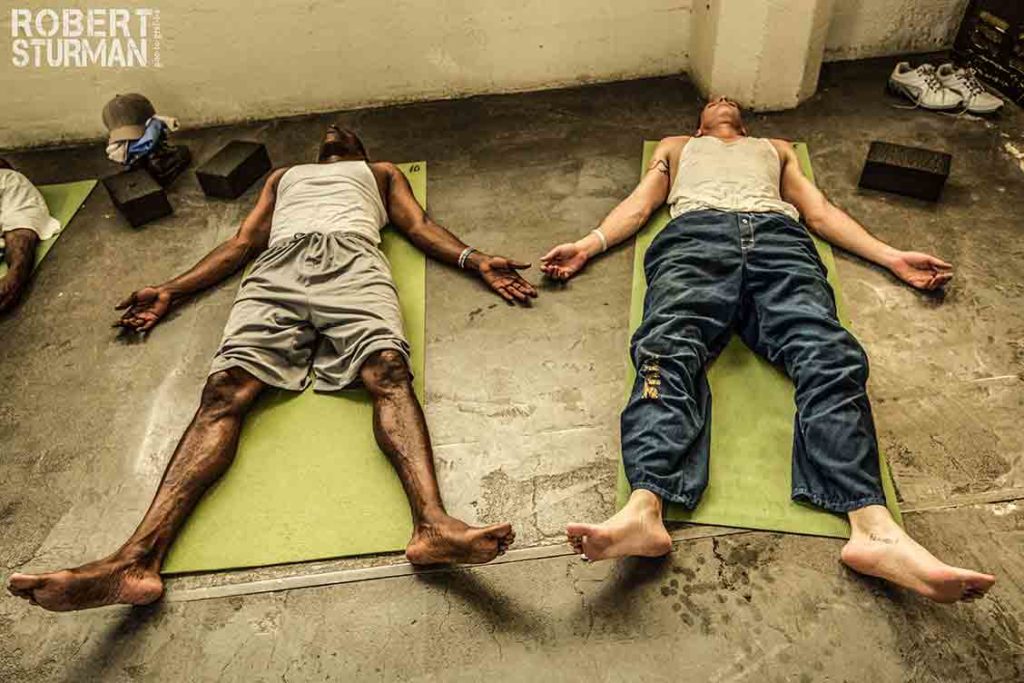
We grieve for George Floyd, Breonna Taylor, who would have turned 27 today, and the many other lives lost to police violence. We grieve for the murder of Ahmaud Arbery, and all the Black lives lost to racist violence. We condemn the centuries of oppression that cut short and diminish Black lives. And we are amazed at the resilience the Black people in our lives demonstrate.
The mission and work of the Prison Yoga Project place us in constant contact with a system and a social environment imbued with racism. If this conclusion is not a given for you, please take the time to read this excerpt from Michelle Alexander’s “The New Jim Crow,” courtesy of Teaching Tolerance.
We understand Black people are often asked, “What can I do to be a better ally?” And we hear a common reply, “Talk to your people.” Well, you are our people. And if we understand the demographic of our audience, the majority of you are white. And we also believe that you are probably asking, “What can I do to be a better ally?” Our urging is to educate yourself.
One aspect of our mission is to educate those wishing to serve in prisons and jails, and an important part of that education is making clear the pervasiveness and destructiveness of racism – explicit, implicit, and systemic.
In the words of author and poet, Scott Woods:
“Racism is an insidious cultural disease. It is so insidious that it doesn’t care if you are a white person who likes black people; it’s still going to find a way to infect how you deal with people who don’t look like you. Yes, Racism looks like hate, but hate is just one manifestation. Privilege is another. Access is another. Ignorance is another. Apathy is another. And so on. So while I agree with people who say no one is born racist, it remains a powerful system that we’re immediately born into. It’s like being born into air: you take it in as soon as you breathe. It’s not a cold that you can get over. There is no anti-racist certification class. It’s a set of socioeconomic traps and cultural values that are fired up every time we interact with the world. It is a thing you have to keep scooping out of the boat of your life to keep from drowning in it. I know it’s hard work, but it’s the price you pay for owning everything.”
Becoming anti-racist is a life’s work. Some of us are just beginning the journey, and some are a few steps further along. We will make missteps, embarrass ourselves, and possibly even offend people with no ill intention in our hearts. Humility and grace save us.
We offer these resources with some indication of where to start if you’re unsure.
If you are new to or uncomfortable with the term white privilege, we recommend “Waking Up White” by Debbie Irving. You might start with this TED Talk from her, “Finding Myself in the Story of Race.”
If you would like to become more skilled at challenging systemic racism and helping your friends understand and acknowledge white privilege, please read “White Fragility” by Robin DiAngelo. For a brief introduction, we offer her this video, “Deconstructing White Privilege with Dr. Robin DiAngelo.”
If you feel ready to better understand the intersection of race and police brutality, we recommend “The Black and the Blue: A Cop Reveals the Crimes, Racism, and Injustice in America’s Law Enforcement,” by Matthew Horace.
If you would like to develop greater empathy for the Black American experience, please read or listen to “Between the World and Me” by Ta-Nehisi Coates. The audiobook is read by the author and we highly recommend hearing his words in his voice.
If you would like to develop greater awareness of a group of people often overlooked, we recommend “Pushout: The Criminalization of Black Girls in Schools” by Monique Morris.
If you would like to understand the power of systemic Racism better, “The Color of Law” by Richard Rothstein.
For an embodied perspective on healing racialized trauma – for Black bodies, white bodies, and blue bodies – please read or listen to “My Grandmother’s Hands: Racialized Trauma and the Pathway to Mending Our Hearts and Bodies” by Resmaa Menakem, who recently sat for an interview with On Being.
To those of you on the frontlines of the protests, thank you, we love, and may you stay safe.
In solidarity,
Prison Yoga Project
